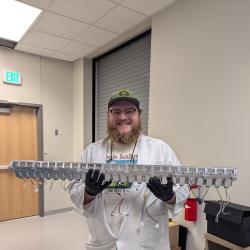Steve Rolston Named Chair of UMD Department of Physics
University of Maryland Physics Professor Steve Rolston has been named chair of the Department of Physics effective July 1, 2016.
“I am excited and delighted to continue the department’s upward trajectory and strengthen its commitment to excellent research and to excellent education,” says Rolston.
Rolston, who joined UMD in 2003, is also co-director and a fellow of the Joint Quantum Institute (JQI), a research partnership between UMD, the National Institute of Standards and Technology (NIST), and the Laboratory for Physical Sciences. As JQI co-director since 2008, Rolston oversaw the institute’s growth into a leader in the fields of quantum physics and information, and the addition of 10 new faculty members. Home to a National Science Foundation-funded Physics Frontier Center, JQI is internationally renowned in the areas of quantum information, atomic physics and condensed matter physics.
In his personal research, Rolston uses ultracold atoms created through laser cooling to study a variety of quantum phenomena. He develops simulators of disordered solid-state systems, works to understand how dissipation can be useful in quantum systems, creates strong quantum connections between atoms and photons, and generates the building blocks for a network of quantum devices.
Rolston earned his Ph.D. in nuclear physics from the State University of New York at Stony Brook and a bachelor’s degree from Wesleyan University. After completing postdoctoral fellowships in atomic physics at the University of Washington and Harvard University, he spent 15 years as a staff scientist in the lab of Nobel Laureate Bill Phillips at NIST. He is a fellow the American Association for the Advancement of Science, the American Physical Society and The Optical Society. In addition, Rolston received the university’s Kirwan Undergraduate Education Award in 2014 in recognition of his outstanding achievement in engaging undergraduates in science education.
Rolston succeeds Drew Baden who completed a 10-year term as physics chair. During Baden’s tenure as chair, the department recruited eight new faculty members and constructed the Physical Sciences Complex. Baden helped reinvigorate the department’s outreach and demonstration program, streamlined its administration structure, and began offering popular new I-series general education courses and honors seminars. While Baden served as chair, the count of undergraduate physics majors grew by 15 percent and the department garnered a National Science Foundation (NSF) S-STEM grant to increase the support of physics majors and student success and persistence in the major. In addition, physics undergraduate students won Goldwater Scholarships, received NSF graduate research fellowships and gained admission to top-ranked graduate programs.
Media Relations Contact: Abby Robinson, 301-405-5845, abbyr@umd.edu
Writer: Mary Kearney
University of Maryland
College of Computer, Mathematical, and Natural Sciences
2300 Symons Hall,
College Park, MD 20742
www.cmns.umd.edu
@UMDscience
About the College of Computer, Mathematical, and Natural Sciences
The College of Computer, Mathematical, and Natural Sciences at the University of Maryland educates more than 7,000 future scientific leaders in its undergraduate and graduate programs each year. The college's 10 departments and more than a dozen interdisciplinary research centers foster scientific discovery with annual sponsored research funding exceeding $150 million.







